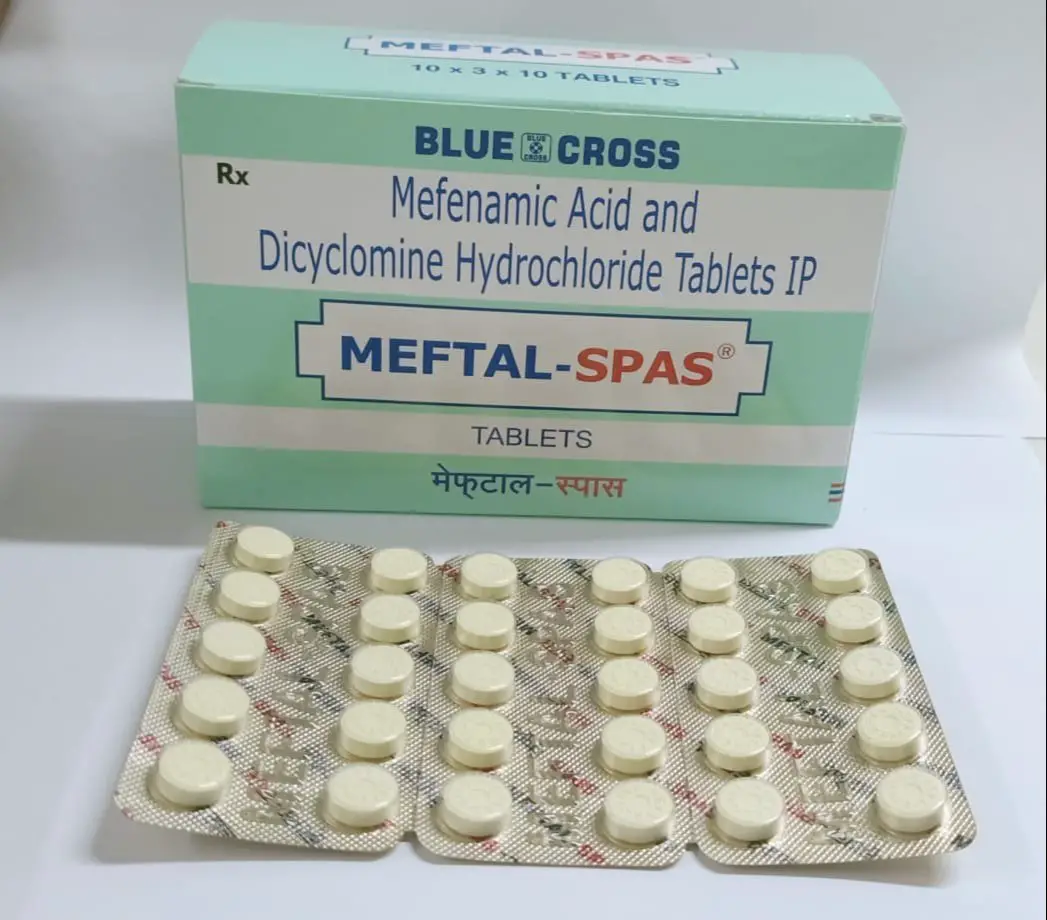Indian Pharmacopoeia Commission (IPC) Highlights Potential Risks Associated with Mefenamic Acid (Meftal).
In a recent development, the Indian Pharmacopoeia Commission (IPC), a key regulatory body overseeing drug standards, has issued a drug safety alert concerning the widely-used painkiller, Mefenamic Acid, commonly sold under the brand name Meftal.
Healthcare professionals and consumers are being urged to exercise heightened vigilance regarding the potential for adverse drug reactions linked to the use of Mefenamic Acid, a nonsteroidal anti-inflammatory drug primarily employed in the treatment of mild to moderate pain. Often prescribed by doctors, it is also utilized for addressing conditions such as menstrual cramps.
The alert, issued in response to preliminary analyses, specifically mentions the identification of eosinophilia and the occurrence of systemic symptoms associated with a condition known as DRESS syndrome. While adverse reactions of this nature are recognized, they are considered rare. Nevertheless, medical experts stress the importance of patient awareness and caution.
Understanding Mefenamic Acid and its Uses
Overview
Mefenamic Acid belongs to the class of nonsteroidal anti-inflammatory drugs (NSAIDs) and is renowned for its efficacy in alleviating pain and inflammation. It is available exclusively through a doctor’s prescription, emphasizing the need for responsible use under professional guidance.
Common Uses
- Pain Management: Mefenamic Acid is widely prescribed to address mild to moderate pain, providing relief to individuals dealing with conditions such as headaches, dental pain, and musculoskeletal discomfort.
- Menstrual Cramps: Women experiencing menstrual cramps often find relief through the use of Mefenamic Acid, as it helps alleviate the pain and discomfort associated with menstrual periods.
- Doctor’s Prescription: Given its potency and potential side effects, Mefenamic Acid is not available over-the-counter. A doctor’s prescription is essential to ensure appropriate usage and to monitor any adverse reactions.
IPC Alert
The recent IPC alert underscores the importance of closely monitoring patients for potential adverse reactions, with a particular focus on eosinophilia and symptoms associated with DRESS syndrome. Healthcare professionals and consumers are encouraged to stay informed and promptly report any unusual reactions.
Also read: Navigating the Complex Relationship Between Teenagers, Smartphones, and Mental Health
Expert Insights
Medical experts emphasize that while adverse reactions to Mefenamic Acid are infrequent, patients should remain vigilant and report any unexpected symptoms to their healthcare providers. Responsible use, coupled with regular monitoring, is crucial to ensuring the safe and effective use of this commonly prescribed painkiller.
In conclusion, while Mefenamic Acid continues to be a valuable tool in pain management, the recent alert serves as a reminder of the importance of balancing its benefits with potential risks. Open communication between healthcare providers and patients is key to fostering a safe and effective healthcare environment.
FAQs
Q: What is Meftal spas used for?
A: Meftal Spas is a medication that combines two active ingredients: Dicyclomine and Mefenamic Acid. It is primarily used for the relief of spasms and pain associated with various conditions. Here’s a breakdown of its uses:
- Spasmodic Pain Relief: Meftal Spas is commonly prescribed to alleviate spasms and cramps in the gastrointestinal tract. This includes conditions like irritable bowel syndrome (IBS) and spastic colon.
- Menstrual Pain Management: Women experiencing intense menstrual cramps find relief with Meftal Spas. The combination of Dicyclomine and Mefenamic Acid helps to reduce the severity of uterine contractions, easing the pain associated with menstruation.
- Smooth Muscle Relaxation: Dicyclomine, one of the components in Meftal Spas, acts as an antispasmodic by relaxing the smooth muscles in the gastrointestinal tract. This can be particularly beneficial for conditions involving spasms, such as colicky pain.
- Anti-Inflammatory Action: Mefenamic Acid, another active ingredient, is a nonsteroidal anti-inflammatory drug (NSAID). It contributes to the medication’s effectiveness by reducing inflammation, which is often associated with pain.
- Pain Management: Meftal Spas is generally prescribed for the management of moderate to severe pain. It can be useful in various painful conditions where muscle spasms and inflammation contribute to the overall discomfort.
- Prescription Medication: It’s important to note that Meftal Spas is a prescription medication. A healthcare professional evaluates the patient’s specific condition and prescribes this combination medicine based on their medical history and the nature of the pain or spasms.
Patients should follow their healthcare provider’s instructions regarding dosage and duration of use. Additionally, it’s crucial to be aware of potential side effects and to promptly report any adverse reactions to the prescribing physician. As with any medication, Meftal Spas should be used under medical supervision to ensure its safe and effective utilization for the intended purposes.
Q: What are the possible adverse reaction of Mefenamic Acid (Meftal)?
A: Mefenamic Acid, commonly found in medications like Meftal, is a nonsteroidal anti-inflammatory drug (NSAID) used to relieve pain and inflammation. While it is generally well-tolerated, like any medication, it can potentially cause adverse reactions. It’s crucial for individuals using Mefenamic Acid to be aware of possible side effects and seek medical attention if any concerning symptoms arise. Some of the potential adverse reactions include:
- Gastrointestinal Issues: Mefenamic Acid can irritate the stomach lining, leading to gastrointestinal symptoms such as nausea, heartburn, indigestion, and abdominal pain. In severe cases, it may cause peptic ulcers or bleeding.
- Allergic Reactions: Some individuals may experience allergic reactions to Mefenamic Acid, presenting as rash, itching, swelling, severe dizziness, or difficulty breathing. Immediate medical attention is necessary if these symptoms occur.
- Cardiovascular Effects: NSAIDs, including Mefenamic Acid, have been associated with an increased risk of cardiovascular events, such as heart attack and stroke. This risk may be higher in individuals with pre-existing heart conditions.
- Renal (Kidney) Effects: Prolonged use of NSAIDs can affect kidney function, potentially leading to fluid retention, elevated blood pressure, and worsening of pre-existing kidney conditions.
- Hematological Reactions: Mefenamic Acid may interfere with blood clotting, leading to an increased risk of bleeding. It is advisable to exercise caution in individuals with bleeding disorders or those taking anticoagulant medications.
- Central Nervous System Effects: Some individuals may experience headaches, dizziness, or nervousness as side effects of Mefenamic Acid. If these symptoms persist or worsen, medical attention may be required.
- Gastrointestinal Bleeding: In rare cases, NSAIDs like Mefenamic Acid can cause serious gastrointestinal complications, including bleeding. It’s important to be vigilant for signs such as black, tarry stools or vomiting blood.
- Liver Function Abnormalities: Mefenamic Acid can affect liver function, leading to elevated liver enzymes. Regular monitoring may be recommended, especially in individuals with pre-existing liver conditions.
It’s crucial for individuals taking Mefenamic Acid to inform their healthcare provider of any pre-existing medical conditions, medications, or allergies. If any unusual or severe symptoms occur, seeking prompt medical attention is essential. This information is not exhaustive, and patients should consult their healthcare professionals for comprehensive guidance based on their individual health status.
Q: Why Indian Pharmacopoeia Commission (IPC) Highlights Potential Risks Associated with Mefenamic Acid?
A: The Indian Pharmacopoeia Commission (IPC) has highlighted potential risks associated with Mefenamic Acid, a nonsteroidal anti-inflammatory drug (NSAID), due to specific adverse drug reactions observed during preliminary analysis. The primary reason for the alert is to draw the attention of healthcare professionals and consumers to the possibility of these adverse effects. Here are key reasons behind the IPC’s emphasis on the potential risks:
- Adverse Drug Reactions Identified: The IPC’s alert is in response to the identification of adverse drug reactions associated with Mefenamic Acid, specifically the presence of eosinophilia and symptoms indicative of DRESS syndrome (Drug Reaction with Eosinophilia and Systemic Symptoms). DRESS syndrome is a severe and potentially life-threatening reaction that involves skin rash, fever, and internal organ involvement.
- Safety Concerns: The primary objective of the IPC is to ensure the safety and efficacy of pharmaceuticals in the country. By highlighting potential risks, the commission aims to raise awareness among healthcare professionals and consumers about the need for careful monitoring and reporting of adverse reactions associated with Mefenamic Acid.
- Healthcare Professional Guidance: The alert serves as a directive for healthcare professionals to closely monitor patients prescribed with Mefenamic Acid, particularly looking out for signs of eosinophilia and symptoms associated with DRESS syndrome. This guidance is crucial for early detection and intervention to mitigate potential harm.
- Patient Awareness: By issuing an alert, the IPC aims to make consumers aware of the potential risks associated with Mefenamic Acid. This empowers patients to recognize and report any unusual symptoms they may experience while taking the medication, fostering a collaborative approach between patients and healthcare providers.
- Ensuring Informed Decision-Making: The IPC plays a crucial role in setting standards for drugs in India. By providing information on potential risks, the commission ensures that healthcare professionals and consumers can make informed decisions about the use of Mefenamic Acid. This includes considering alternative medications or closely monitoring patients at a higher risk for adverse reactions.
In summary, the IPC’s alert is a proactive measure to address safety concerns related to Mefenamic Acid, emphasizing the importance of vigilant monitoring, early detection, and informed decision-making in the interest of patient safety and well-being.
Q: What are the safest alternative medicine of Mefenamic Acid (Meftal) specially for Menstrual cramps?
A: For individuals seeking alternatives to Mefenamic Acid (commonly found in Meftal) for the relief of menstrual cramps, several options are available. It’s essential to consult with a healthcare professional to determine the most suitable alternative based on individual health conditions and considerations. Here are some commonly recommended alternatives:
- Ibuprofen: Ibuprofen is another NSAID that is often used for pain relief, including menstrual cramps. It works by reducing inflammation and easing pain. Like Mefenamic Acid, it is important to take it with food or milk to minimize potential stomach upset.
- Naproxen: Naproxen is a longer-acting NSAID that provides extended pain relief. It can be taken less frequently than some other NSAIDs, making it a convenient option for managing menstrual cramps.
- Acetaminophen: Acetaminophen is not an NSAID but is commonly used for pain relief. It is considered gentler on the stomach than NSAIDs and can be an option for those who cannot tolerate NSAIDs.
- Heat Therapy: Applying heat to the abdominal area can help relax muscles and alleviate menstrual cramps. This can be achieved through a hot water bottle, heating pad, or a warm bath.
- Prescription Medications: In some cases, healthcare professionals may prescribe other medications, such as oral contraceptives (birth control pills), which can regulate hormonal fluctuations and reduce the severity of menstrual cramps.
- Lifestyle Changes: Adopting a healthy lifestyle, including regular exercise, a balanced diet, and stress management, can contribute to overall well-being and may help reduce the intensity of menstrual cramps.
It’s crucial to communicate openly with a healthcare provider about symptoms and any challenges experienced with medications. They can provide personalized advice and guidance based on an individual’s health history and specific needs.
Ultimately, the choice of an alternative to Mefenamic Acid for menstrual cramps depends on factors such as medical history, allergies, and individual response to medications. Always follow healthcare professionals’ recommendations and guidelines for safe and effective pain management.



